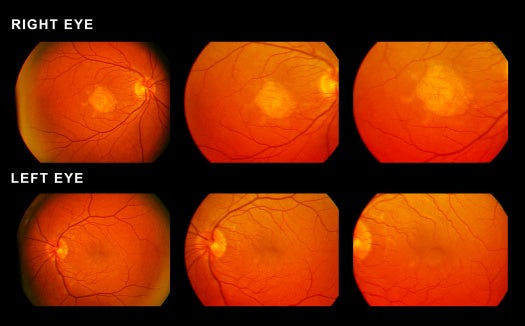Macular Degeneration Treatment in Derry & Surrounding Areas
Alleviate the Symptoms of Macular Degeneration Today
Invest in your vision with Spindel Eye Associates’ leading-edge macular degeneration treatment services in Derry, NH. Macular degeneration poses a significant threat to sight, especially as we age, and demands specialized care to mitigate its effects. At Spindel Eye Associates, our skilled team of ophthalmologists is committed to offering cutting-edge treatments tailored to the unique needs of those grappling with macular degeneration. Early intervention is key, and our advanced technologies ensure you receive the highest standard of care. Take charge of your eye health—schedule a consultation today. Your path to vision preservation begins with Spindel Eye Associates.
What Is Macular Degeneration?
Macular degeneration manifests in two primary forms, each distinguished by distinct characteristics and progression patterns. Dry macular degeneration, the more common type, involves the gradual deterioration of light-sensitive cells in the macula. This form typically progresses slowly, leading to a gradual loss of central vision. In contrast, wet macular degeneration is marked by the growth of abnormal blood vessels beneath the macula, a process known as neovascularization. These vessels are prone to leakage, causing rapid and severe vision changes. While dry macular degeneration may advance more slowly, wet macular degeneration often leads to more sudden and pronounced visual impairment. Timely diagnosis and monitoring are essential for implementing appropriate interventions tailored to the specific form of macular degeneration a patient is experiencing.

Causes & Risk Factors
Understanding the common causes and risk factors of macular degeneration is crucial for proactive eye health management. Here are three significant contributors to the development of this condition:
- Age – The primary risk factor for macular degeneration is advancing age, with the likelihood of developing the condition increasing significantly after age 50. The risk of degeneration and vision impairment rises as the macula undergoes natural aging processes.
- Family History and Genetics – A family history of macular degeneration can elevate an individual’s risk, indicating a genetic predisposition to the condition. Certain genetic factors may contribute to the development and progression of both dry and wet forms of macular degeneration.
- Smoking – Smoking is a modifiable risk factor strongly associated with an increased risk of macular degeneration. The harmful chemicals in tobacco smoke can adversely affect the blood vessels in the eyes, potentially accelerating the progression of this sight-threatening condition.
Symptoms & Detection
Macular degeneration symptoms often manifest gradually and may include blurred or distorted central vision, difficulty recognizing faces, and the perception of dark or empty spaces in the central visual field. In its early stages, macular degeneration may not exhibit noticeable symptoms, underscoring the significance of regular eye examinations for early detection. Eye care professionals use specialized tests, such as optical coherence tomography (OCT) and fluorescein angiography, to assess the macula’s condition and identify signs of macular degeneration. Timely detection allows for appropriate intervention strategies to slow the progression of the disease and preserve as much vision as possible.
Treatment Options
Treatment options for macular degeneration vary based on the form and stage of the condition. In dry macular degeneration, where no abnormal blood vessels are present, treatment primarily involves lifestyle modifications and nutritional supplements aimed at slowing the progression. For wet macular degeneration, characterized by neovascularization, interventions may include anti-VEGF injections to inhibit the growth of abnormal blood vessels and reduce leakage. Photodynamic therapy, laser surgery, or other surgical procedures may be considered in certain cases. While these treatments can help manage the progression and symptoms, there is no cure for macular degeneration. Early detection and proactive management play a crucial role in optimizing treatment outcomes and preserving as much vision as possible. Regular consultations with eye care professionals are essential to determine the most suitable treatment approach for individual cases of macular degeneration.
Contact Spindel Eye Associates
In the pursuit of preserving your vision against the challenges of macular degeneration, Spindel Eye Associates in Derry, NH, is your dedicated partner. Our commitment to advanced treatments and personalized care underscores our mission to provide the highest quality of service. Macular degeneration demands early intervention, and our experienced team is here to guide you every step of the way. Take control of your eye health—schedule a consultation with Spindel Eye Associates today. Together, let’s navigate the path toward maintaining the clarity and vibrancy of your vision. Don’t wait; your eyes deserve the best care. Act now to secure a future of clear sight.
